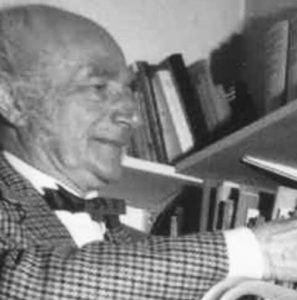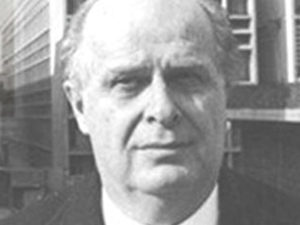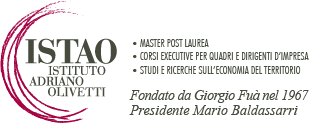Where it all began
RADICI PROFONDE
ISTAO “Instituto Adriano Olivetti di studi per la gestione dell’economia e delle aziende” is one of the oldest managerial schools in Italy. The name finds its origins in Adriano Olivetti with who Giorgio Fuà had the chance to collaborate for nearly a decade. An inspiration that comes from his intuitions on the social responsibility of enterprises together with his new perspectives on the relationships between industry and community. ISTAO was founded as a moral association without lucrative scope on the 8th of February 1967 by Giorgio Fuà with the involvement of a group of university professors and other personalities of the academic field, interested in experimenting new didactical ways for undertaking research. Still today, after 50 years, teaching and research are recognized to be the two leading pillars of the Institute. The first training project of ISTAO started in 1967 as a pilot course for university-graduate economists.
The course was organized with the involvement of Olivetti Foundation, the America Social Science Research Council and the support from CNR. For four years, ISTAO’s courses have been organized only for applied economists willing to enter the academic career.In 1972 together with the course on “Applied Economics” ISTAO offered also a second one in “Management of Enterprises” to address the growing need of managers in supporting entrepreneurs in developing their business. The managerial and entrepreneurial training activities have never stopped, and today the Master in Entrepreneurial Strategy and Management represents the leading course offered by the institute.
Among the reasons why ISTAO still today is an outstanding school in the scenario of national business school, recalling Fuà words:
- A laboratory for innovative experiments
- Strong bond with enterprises and institutions
- Teaching methods in which learning by doing is dominant respect to a learning by listening approach.
- Focus on developing entrepreneurs civilly and culturally engaged. An entrepreneur-leader with the mission of guiding and supporting the growth of a group of people making them feel involved in a shared creative project of which to be proud of.
GIORGIO FUA’ AND ADRIANO OLIVETTI

Giorgio Fuà (1919-2000)
Fuà defined himself as an “operative economist” who had the opportunity to collect a solid and significant set of experiences in enterprises and institutions of national relevance. Experiences that resulted determinant in defining the methods and approaches that will characterize the scientific and teaching activities of his life. The capacity to put himself into practical problems and the opportunity to work with great leaders as Ernest Rossi at Arar, Adriano Olivelli in Olivetti, Gunnar Myrdal at the United Nations Economic Commission for Europe, Enrico Mattei at ENI, allowed him to analyse and interpret the economic reality of Italy and of Marche Region with originality, clearness and concreteness. After the experiences with great personalities of the economic world, Giorgio Fuà in 1959 left ENI to set up the Faculty of Economics at Ancona and guide the new-born academic community.
In 1966 he was involved in training the ruling class and the entrepreneurs of the future through ISTAO.
Taking inspiration from the lessons of Adriano Olivetti, he suggested developing entrepreneurial capacities by setting an annual course. The course was known to be selective and hard-working, distinctive for its teaching methods respect to those of the academic environment of the time.
Through his “masters” he matures the central idea of all his studies based on the figure of the entrepreneur-leader. The main characteristic of an entrepreneur is that of giving a meaning and an objective to others’ work. Entrepreneur-leaders don’t focus only on profits, but love their product, know who to motivate their collaborators without authority, finding ways to determine the growth of the environment that saw them grow. Fuà has been the inspirator and interpreter of what in the following year will be called the “NEC model” or “Adriatic Line of Development”

Adriano Olivetti (1901-1960)
Who was Adriano Olivette, the entrepreneur with who Fuà collaborated from 1941 to 1949 and from who ISTAO was named after? In a few words, he was an urbanist, editor, writer, and mainly an entrepreneur who strongly believed in technology, innovation and on the social responsibility of enterprises. Son of Camillo, electronic engineer who established in 1908 the Ivrea la Ing.c. Olivetti & C., first national producer of typewriters. Adriano graduated in industrial chemistry at the Polytechnic of Turin and in 1924 began an apprenticeship in the family’s business as an employee. The following year he travelled in the United States where he visited a variety of firms. Back from his trip, he suggested a wide plan of actions to increase significantly the productivity and the sales of the products. In 1932 the first portable typewriter with the name MP1 was launched. Adriano has been an entrepreneurial man well-aware of the impact of innovation, excellence of technology and design, of international markets, and of workers’ needs.
In fact, his managerial style was based on improving the working conditions of employees. With the support of young and competent architects he established industrial buildings, houses for employees, canteens, nurseries, medical assistance structures with the objective of aligning the improvement of working conditions with the quality of life. For Olivetti the enterprise is not only a productive place, but it becomes the driver of the economic and social growth and as such has responsibilities towards society and territory. Adriano Olivetti was also a writer and in 1937 founded the journal Tecnica e Organizzazione, where he published a variety of articles on technology, economy and industrial sociology. In 1945 he set up the Edizioni di Comunità, publishing House that issued important works in different areas, such as politics, sociology, philosophy of organizations, promoting important Authors of the field.
